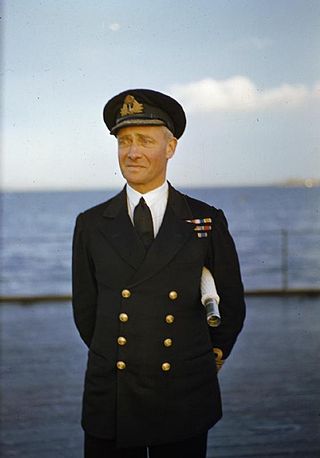Related Research Articles

The Distinguished Service Order (DSO) is a military decoration of the United Kingdom, as well as formerly of other parts of the Commonwealth, awarded for operational gallantry for highly successful command and leadership during active operations, typically in actual combat. Since 1993 it has been awarded specifically for "highly successful command and leadership during active operations", with all ranks being eligible. It is a level 2A decoration (order) in the British system of military decorations.

Philip Lutley Sclater was an English lawyer and zoologist. In zoology, he was an expert ornithologist, and identified the main zoogeographic regions of the world. He was Secretary of the Zoological Society of London for 42 years, from 1860 to 1902.

Captain Frederic John Walker, was a British Royal Navy officer noted for his exploits during the Second World War. Walker was the most successful anti-submarine warfare commander during the Battle of the Atlantic, and was known popularly as Johnnie Walker.

Acting Captain Frederick Thornton "Fritz" Peters, & Bar was a Canadian-born sailor in the Royal Navy and a recipient of the Victoria Cross, the highest award for valour in the face of the enemy that can be awarded to British and Commonwealth forces.

Admiral Sir Max Kennedy Horton, was a British submariner during the First World War and commander-in-chief of the Western Approaches in the later half of the Second World War, responsible for British participation in the Battle of the Atlantic.

Admiral Sir Walter Henry Cowan, 1st Baronet,, known as Tich Cowan, was a Royal Navy officer who saw service in both the First and Second World Wars; in the latter he was one of the oldest British servicemen on active duty.
Edward Bartlett was an English ornithologist and herpetologist. He was the son of Abraham Dee Bartlett.

Admiral of the Fleet John Cronyn Tovey, 1st Baron Tovey,, sometimes known as Jack Tovey, was a Royal Navy officer. During the First World War he commanded the destroyer HMS Onslow at the Battle of Jutland and then commanded the destroyer Ursa at the Second Battle of Heligoland Bight. During the Second World War he initially served as Second-in-Command of the Mediterranean Fleet in which role he commanded the Mediterranean Fleet's Light Forces. He then served as Commander-in-Chief of the Home Fleet and was responsible for orchestrating the pursuit and destruction of the Bismarck. After that he became Commander-in-Chief, The Nore with responsibility for controlling the east coast convoys and organising minesweeping operations.

George Limbrey Sclater-Booth, 1st Baron Basing PC, FRS, DL, known as George Sclater-Booth before 1887, was a British Conservative politician. He served as President of the Local Government Board under Benjamin Disraeli between 1874 and 1880.

Ibis, subtitled the International Journal of Avian Science, is the peer-reviewed scientific journal of the British Ornithologists' Union. It was established in 1859. Topics covered include ecology, conservation, behaviour, palaeontology, and taxonomy of birds. The editor-in-chief is Dominic J. McCafferty. The journal is published by Wiley-Blackwell in print and online. It is available free on the internet for institutions in the developing world through the OARE scheme.

William Lutley Sclater was a British zoologist and museum director. He was the son of Philip Lutley Sclater and was named after his paternal grandfather, also William Lutley Sclater.

HMS Wild Swan was an Admiralty modified W-class destroyer built for the Royal Navy. She was one of four destroyers ordered in 1918 from Swan Hunter and Wigham Richardson, Wallsend-on-Tyne under the 14th Order for Destroyers of the Emergency War Program of 1917–18. She was the second Royal Navy ship to carry the name, after the sloop HMS Wild Swan in 1876. Like her sisters, she was completed too late to see action in the First World War.

Rear Admiral Philip John Mack DSO* was an officer of the British Royal Navy.

Vice Admiral Sir Peter William Gretton was an officer in the Royal Navy. He was active in the Battle of the Atlantic during the Second World War, and was a successful convoy escort commander. He eventually rose to become Fifth Sea Lord and retired as a vice admiral before entering university life as a bursar and academic.

Admiral Sir Charles Thomas Mark Pizey was a Royal Navy officer who served as the last Commander-in-Chief and first Chief of Naval Staff of the Indian Navy from 1951 to 1955.
Vice Admiral Sir Geoffrey Barnard & Bar was a Royal Navy officer who became Deputy Chief of the Naval Staff.
Edward Albert Gibbs, was an officer in the Royal Navy who commanded anti-submarine destroyers in the Second World War. He was the first person to receive the Distinguished Service Order (DSO) four times in the Second World War.
St Peter's Court was a preparatory school for boys at Broadstairs in Kent, UK. In 1969, it merged with the nearby Wellesley House School and its site was redeveloped for housing.
Commodore Raymond Hart was a British seaman and a Royal Navy officer who served during the Second World War.

Major General Edward Barrington de Fonblanque was a British Army officer of the First World War and Second World War, and later served as aide-de-camp to King George VI.
References
- ↑ "COMMANDER CLAUDE SCLATER DSO and bar, FRGS, MA". The Hallowes Genealogy. Retrieved 5 March 2018.
- ↑ "Claude Edward Lutley Sclater DSO, RN". uboat.net. Retrieved 1 May 2024.
- ↑ "Sclater, Claude Edward Lutley". National Archives . Retrieved 1 May 2024.